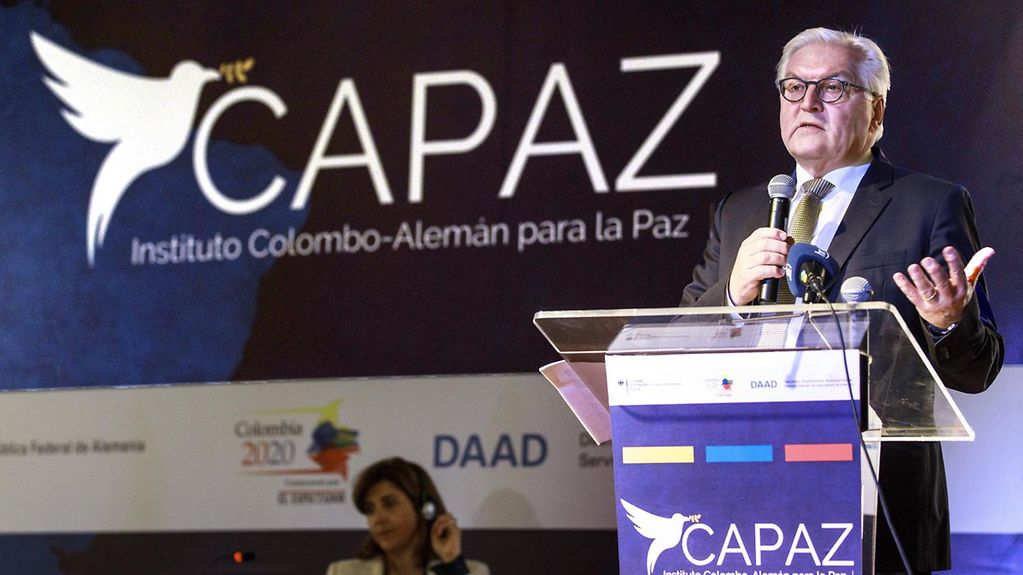Der Link wurde in Ihrer Zwischenablage gespeichert
Promoting international exchange, preserving cultural heritage, strengthening strategic communication abroad: Germany’s Foreign Cultural and Educational Policy is an integral part of its foreign policy. A new report, adopted today in the Cabinet, provides information about diverse activities.
3 Min. Lesedauer

The then Federal Foreign Minister, Frank-Walter Steinmeier, opens the German–Colombian Peace Institute (CAPAZ)
Foto: Michael Gottschalk/photothek.net
Flight and migration, a mistrust of multilateral cooperation, waning support for the idea of European integration: the period between January and December 2017 was marked by crises across many parts of the world.
Authoritarian powers also undertook various efforts at public diplomacy, that is using state public relations work abroad to push through their own values and ideas. It is thus clear that Germany and Europe are “in competition for narratives”.
The Federal Government uses what is known as “strategic communication” to counter this competition for narratives. It adapts its communication content and tools so as to be able to respond to increasing levels of disinformation by state and non-state actors and the changing face of political communication (in the form of “post-factual politics”, for instance). Authoritarian regimes in particular invest massive amounts of time and effort in their public diplomacy to spread their own worldviews, especially in the digital space.
Germany continued to expand its strategic communication abroad in 2017, especially its cooperation with its international broadcaster Deutsche Welle, to gear it up for the digital future. Deutsche Welle’s independent programming is a key element of attempts to counter state and non-state actors’ disinformation. The goal is to portray a realistic picture of Germany and convey objective facts.
Part of Germany’s work to uphold our values and interests includes standing up for the freedom of art and science across the world. That includes, for instance, the UNHCR's Albert Einstein German Academic Refugee Initiative Fund (DAFI) scholarships, which enable refugees to study for a degree in their countries of asylum.
It also includes expanding the Alexander von Humboldt Foundation’s Philipp Schwartz Initiative, launched in 2015, which provides targeted support to academics. The Initiative allows German universities and research institutes to host persecuted scientists for up to two years.
In the period under review, the German Academic Exchange Service (DAAD) opened the German–Colombian Peace Institute (CAPAZ) at the Universidad Nacional Bogotá, thereby underlining the peace policy aspect of Germany’s Foreign Cultural and Educational Policy. CAPAZ is a research, study and advisory facility which engages with the pressing issues of peace research, studying the past, conflict prevention and shaping a post-conflict society in Colombia. After more than 50 years of civil war, the Institute aims to accompany the fragile peace process in the country.
In the spirit of closer European cooperation, the Franco–German Ministerial Council agreed at its meeting in Paris on 13 July 2017 to establish at least 10 integrated German–French institutes by 2020.
The Federal Government also supported three Places of Culture in Turkey (Izmir, Gaziantep and Diyarbakir) in a project run jointly with France, the Netherlands, Sweden and the Turkish Anadolu Kültür Foundation. These Places of Culture all strengthen the cultural infrastructure in their regions and create the space and options which civil society urgently needs to thrive. This pilot project for a common European, post-nation-state foreign cultural and educational policy aims to facilitate exchange and co-productions with local artists and creative professionals.
Germany continued its work to protect cultural heritage by expanding the Archaeological Heritage Network for the protection, preservation and reconstruction of cultural heritage, which was founded in 2016.
The Coalition Agreement sets out in great detail the importance of Germany’s Foreign Cultural and Educational Policy. Important projects are in planning, some are already underway. The Federal Government wants to use the Year of German–American Friendship 2018/19, for example, to reinvigorate the transatlantic relationship.
Civil society in the EU’s Eastern Partnership countries (Armenia, Azerbaijan, Belarus, Georgia, Moldova, Ukraine) will also continue to receive support. The Federal Government will, not least, also be significantly strengthening Deutsche Welle.